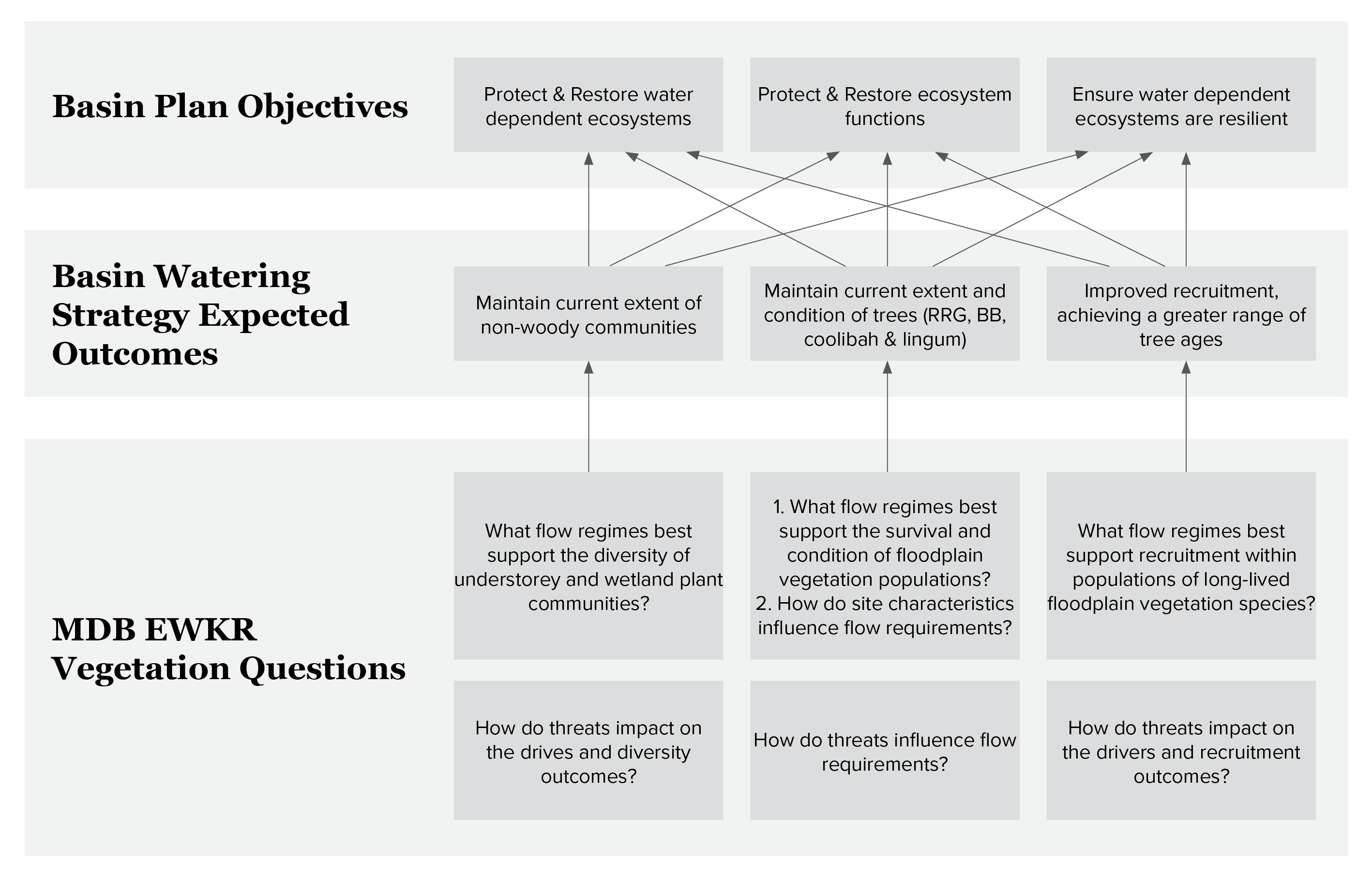
Native plants are critical to the processes that maintain healthy ecosystems, especially nutrient and carbon cycling, and water and sediment oxygenation. When we talked with water managers they identified two areas for our research to explore:
1. Understorey and wetland plants
Our research aims to define the appropriate flow regimes required to support vegetation diversity, and any other factors that might threaten this diversity. We identify how changing flow regimes might affect the composition of plant communities, from the species level to whole communities, and from long-term time-scales (decades) through medium-term (1-10 years), down to single floods.
2. Trees and other long-lived vegetation
Our research focusses on defining optimum flow regimes for the germination of seedlings and the growth of saplings. This research aims to identify the flows required to ensure there are trees of different ages, which is a broad indicator of tree population health.
For both areas, our work is analysing how site characteristics (soil type, climate, and groundwater), increased temperature, and changes in rainfall seasonality could influence flow requirements.
How our vegetation work fits within Basin Plan Objectives:
Application
We work closely with water managers throughout the research process to see how our investigations can be incorporated into their day-to-day water management decisions. Watch the video to find out some of the most recent work we have been doing, as well as following the links to stories recently featured in the popular RipRap Magazine – Thrive: nature, water and wellbeing.
Our MDB EWKR Vegetation Team:
| Team Members | Biography |
| Cherie Campbell Vegetation Theme Coordinator La Trobe University cherie.campbell@latrobe.edu.au |
Cherie’s main research interests relate to understanding the maintenance of aquatic and floodplain vegetation in riverine corridors, monitoring ecological responses to flow regimes, and assessing and interpreting patterns in aquatic and floodplain vegetation composition. https://scholars.latrobe.edu.au/display/cjcampbell |
| Sam Capon Griffith University Samantha.capon@griffith.edu.au |
Sam is an ecologist with a background in the ecology and management of riverine and wetland landscapes, especially their vegetation and particularly in dryland regions. Much of her work focuses on informing water and land management to protect, enhance and restore these ecosystems. https://www.griffith.edu.au/environment-planning-architecture/australian-rivers-institute/members/dr-samantha-j.-capon |
| Cassandra James James Cook University Cassandra.james@jcu.edu.au |
Cassie is an experienced freshwater plant ecologist with particular experience in northern Australia including the northern Basin. She is interested in landscape scale responses, examining ecological responses through the analysis of very large spatial datasets and vegetation data using a wide range of statistical, programming and modelling tools, as well as experience modelling the impacts of climate change on freshwater biota at broad spatial scales. |
| Kay Morris Arthur Rylah Institute kaylene.morris@delwp.vic.gov.au |
Kay is a senior scientist at the Arthur Rylah Institute with research interests in wetland ecology, vegetation assessment, monitoring program design and conceptual model development, including experience assessing the response of aquatic vegetation to a range of stressors. She recently undertaken work on propagule dispersal. |
| Jason Nicol South Australia Research & Development Institute Jason.Nicol@sa.gov.au |
Dr Jason Nicol is the Plant Ecology Sub-program Leader at SARDI Aquatic Sciences. The role is responsible for leading and developing research projects to study the ecology of aquatic and riparian flora in freshwater dependent ecosystems throughout the State. Jason is regarded as a national leader in the field of aquatic and riparian plant ecology and research interests include; seed banks, impacts of altered hydrological regimes, vegetation surveys, monitoring and evaluation and ecological risk assessment. http://www.pir.sa.gov.au/__data/assets/pdf_file/0020/46406/Nicol_Jason_2016.pdf |
| Rachael Thomas NSW Office of Environment & Heritage rachael.thomas@unsw.edu.au |
Rachael currently works for the NSW Office of Environment and Heritage undertaking research on landscape scale vegetation dynamics using remote sensing and modelling techniques. Rachael is also completing a PhD at the University of New South Wales. |
